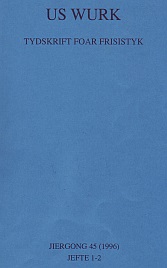De achterheaksels ENS en HEID yn it Frysk
Abstract
Modern West Frisian has two, at first sight synonymous, nominalising suffixes: HEID (pron. [hit]) and ENS (pron. [ə˜s]). HEID is obviously etymologically the same as Dutch HEID, German HEIT etc. ENS is also found in other parts of the North of the Netherlands, in the East and North Frisian speaking areas, and in the more northern parts of the Low German speaking areas. It is generally agreed that ENS derived from NISSE/NIS due to lack of stress. ENS can only be attached to adjectives, whereas HEID also took other morphological categories as bases (at least in the past). ENS is found already in Old Frisian, but it seems that it did not really become highly productive until after 1800. In numerous cases Frisian nominalises adjectives by means of either ENS or HEID. In many other cases, however, only one of the two may be used. A close study of the relevant forms has revealed that ENS is favoured when the stress is on the syllable immediately preceding ENS, i.e. ENS is the favoured suffix for monosyllabic adjectives, and for polysyllabic adjectives with final stress (usually Romance loanwords). Unstressed ENS, therefore, is the preferred form after stressed syllables. In all other cases there does not seem to be any marked preference for either HEID or ENS. There is not any real semantic difference apart from the fact that nominalisations in ENS are uncountable, whereas those in HEID may be both countable and uncountable. ENS probably owes its popularity (especialy in written Frisian) not only to the fact that it is apparently rhytmically more acceptable after stressed syllables, but also to the tendency that has occasionally been termed distânsiearringssucht, i.e. the desire to make (written) Frisian as much different as possible from Standard Dutch, which does not have this suffix in this particular form.

